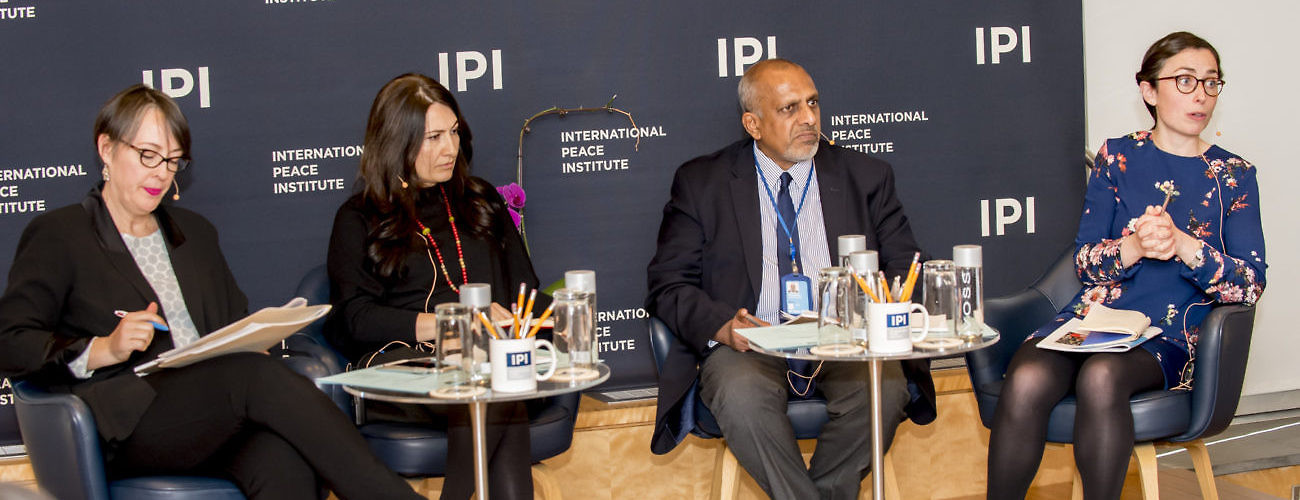Constitution-making is a frequent feature of peace processes, and a March 26th IPI policy forum cosponsored by Inclusive Security and the Permanent Mission of Estonia to the United Nations explored how various countries have taken up the task. The panel centered on countries emerging from conflict and how an inclusive constitution-making approach was essential to their successful transition to peace.
“In the path to lasting peace, constitution-making has been and will be an important angle,” said Sven Jürgenson, Estonia’s Permanent Representative to the UN. “It can give an opportunity to build trust and acknowledge the reasons that may have contributed to conflict.”
Highlighting the importance of inclusivity, he said, “Gender equality is a greater predictor of peace than a country’s wealth or levels of democracy.”
Mariam Jalabi, Founding Member of the Syrian Women’s Political Movement, and Representative of the Syrian Opposition Coalition Office to the UN, pointed out that the success of a new constitution relies as much on the process of putting it in place as it does on the constitution’s creation. “When we are discussing a constitution, we need to remember that having a constitution, no matter how perfect that constitution may be, is not going to be the solution unless it’s implemented,” she said.
She stressed the difficulty of forming a constitution while a country is still unstable. Often, she explained, international interference can be a hindrance to peacebuilding. “When it comes to building the constitution itself,” she said, “to protect the rights of all Syrians under a law that treats everyone equally, it has to be done by Syrians. It has to be done in an environment where all Syrians can participate.” For this to happen, the government must support an inclusive process, she said.
Ms. Jalabi quoted the Special Envoy for Syria, Staffan de Mistura, who noted four points of discussion for Syrian policy. The first, she said, is the significance of a constitution in Syria. The other three are elections, a transitional governing body, and terrorism.
Constitutions should not be created in a bubble, argued Rohan Edrisinha, Senior Political and Constitutional Advisor of the UN Department of Political Affairs. In order to use the constitution as an instrument of peace, “you’ve got to address the root cause of conflict,” he said.
He mentioned Sri Lanka as a case study on lasting peace, due to its ethnic mix, which, historically, is a factor likely to spur conflict. He voiced the importance of addressing the needs of different groups in drawing up a constitution. Parties who signed the peace agreement, he said, should “use constitutional reform as a basis for resolution of the conflict.”
A significant factor in sustaining peace, he added, is recognizing that “there is a need for compromise, that there’s a need to listen to the other and try to understand the other even if you might not agree with the other.”
Building upon this call to increase diversity in policymaking, Marie O’Reilly, Director of Research and Analysis at Inclusive Security, pointed to her recent research findings that when women participate in all levels of the constitution-making, there is greater evidence of effective and lasting peace. In many countries, she said, women have united under the joint agenda of backing constitutional provisions that advance gender equality and women’s inclusion in society, even despite divisions on other political views. They have set aside “acute grievances” on conflict between them to pursue the cause of inclusivity, she reported.
On a video teleconference from San Diego, California, Amira Yahyaoui, founder of Al Bawsala, the Tunisian human rights group, described the 2012 election experience in Tunisia. Rather than voting for experts or lawyers, she said, Tunisians elected “normal people that you would trust with your constitution.” People saw faces that “actually looked like them,” she said.
For the Tunisian people, the process of writing a constitution sometimes got in the way of constructing concrete policy decisions, she said. “We ended up spending three years discussing who we are, what we are, how we define ourselves and we wrote the constitution…not about our ideals but about what we are.” This process was reflective of the diverse community, and was ultimately more useful as a result.
The report, “How Women Influence Constitutions,” from Inclusive Security, reveals that “women are the single largest group excluded from constitution-making processes.” It offers five lessons for women seeking to influence negotiations and men seeking to support inclusivity in constitutional reform: mobilize early, incentivize women’s participation, go beyond tokenism, cultivate strategic alliances and broad coalitions, and frame the debate effectively.
Ms. Yahyaoui focused on the difference between women’s inclusion for the sake of filling a quota versus women’s active and enthusiastic involvement in the constitution-making process. In Tunisia, she explained, men were forced to include women in the constitution-making process as a result of quotas. Even when the men were not convinced that women would contribute positive insight, and even when the women had little experience or desire to write a constitution, the women took on leadership roles and headed various committees, particularly those on rights and freedoms. When the choice is made to include women in politics, she said, even if this choice is due to the need to meet a quota, “it ends up being a good choice.”
Noting that inclusive constitution-making is about ensuring that a diverse section of women are represented across all aspects of a political process, she said, “I truly believe that when you yourself have been excluded, you’re the best to work on inclusion because the moment you get that seat, you want to share it with the maximum number of people who are outside.”
IPI Research Fellow, Sarah Taylor, moderated.








